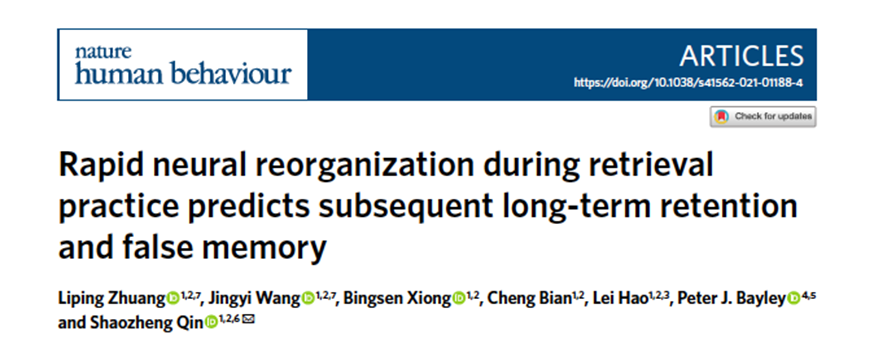
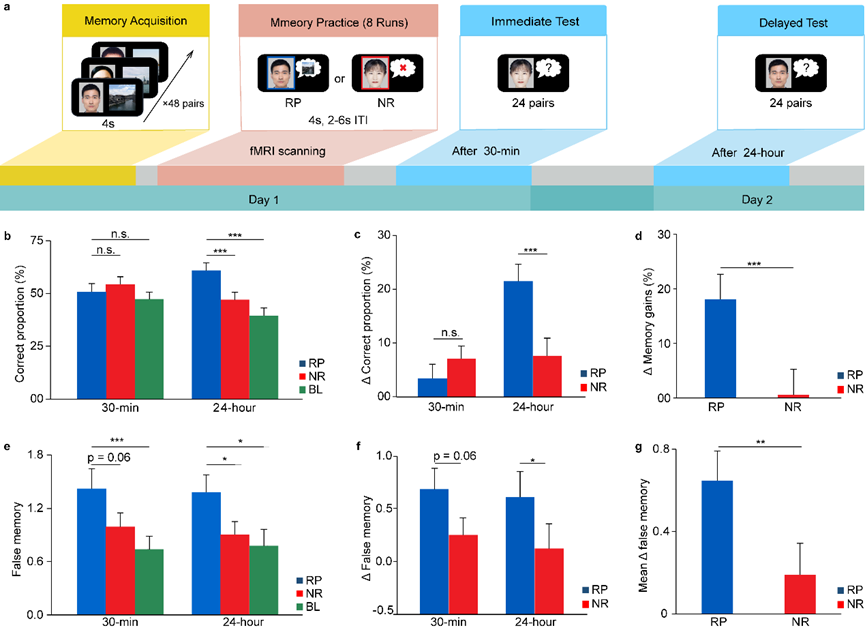
Fig. 1: Experimental design and memory differences on RP and NR at two immediate and long-term retention tests.
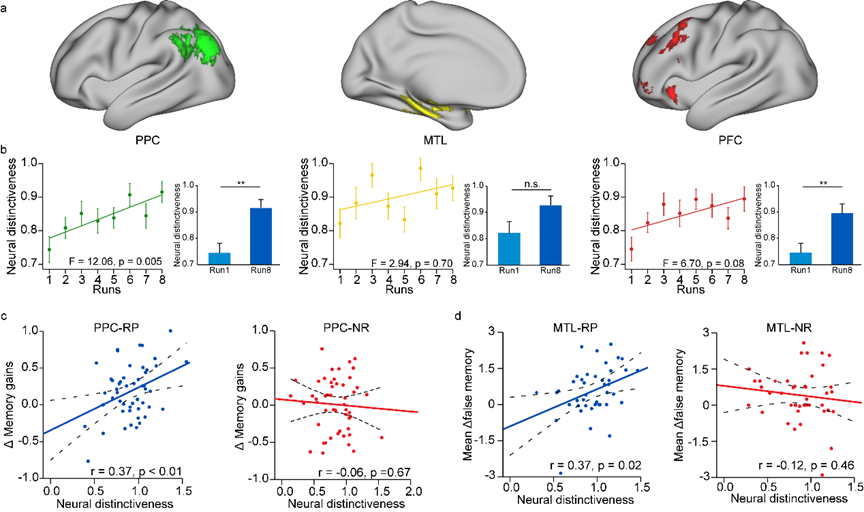
Fig. 2: Dynamic changes in intertrial neural pattern distinctiveness in the PPC, MTL and PFC systems and their relation to subsequent memory outcomes.
They further examined how dynamic reconfiguration of memory-related brain networks during retrieval practice. The results indicate that retrieval practice enhanced the efficiency of memory-related brain networks (Fig. 3), through building up PPC and MTL connections with the ventrolateral and dorsolateral prefrontal cortex that predicted long-term retention gains and false memory, respectively (Fig. 4-5).
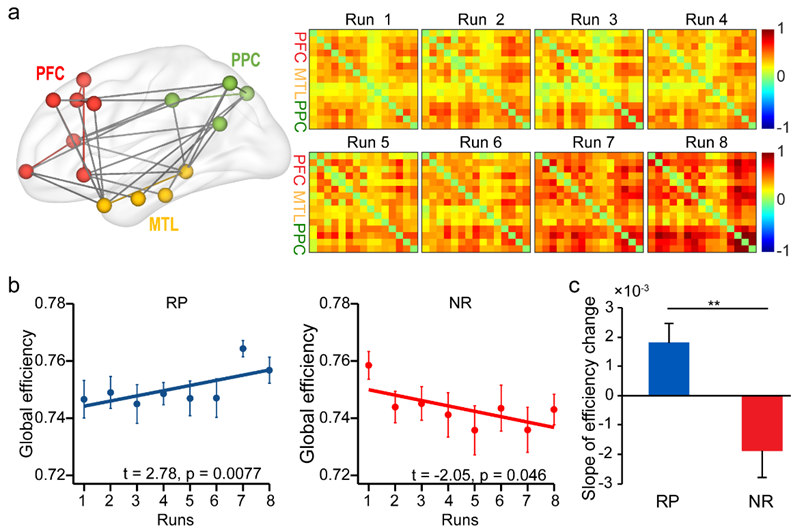
Fig. 3: Dynamic changes in memory-related neural network configurations over retrieval practice.
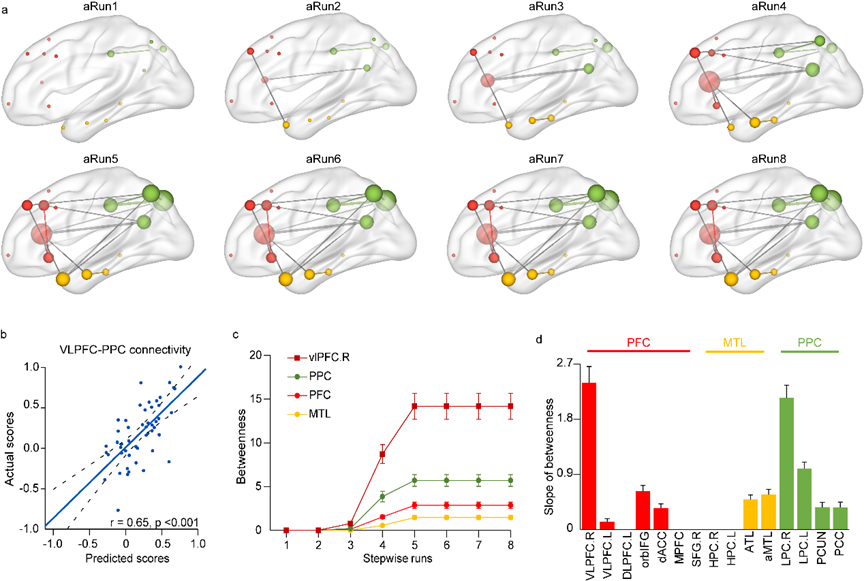
Fig. 4: Brain network-based prediction of long-term retention gains after consolidation and network reconfiguration over retrieval practice.
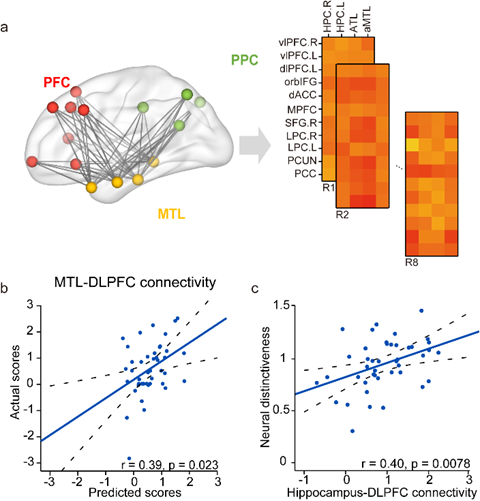
Fig. 5: MTL-based network prediction of general false memory outcome.
The innovations of this study are mainly reflected in the following two aspects. First, the research team creatively integrates retrieval practice with memory consolidation and false memories. Through this integration, two seemly contradictory outcomes of retrieval practice are systematically investigated and confirmed. That is, retrieval practice can not only enhance long-term memory especially after consolidation, but can also cause memory distortions in a certain extent. Second, this study identified dynamic changes of how multi-voxel representation patterns and functional organization of brain networks contribute to different memory outcomes.
Since the fact that retrieval practice has been widely used in different scenarios in real life (such as in school classrooms and memory recovery training for patients with memory impairment, etc.), the "double-edged sword" effect of retrieval practice revealed by this study awakens these practical applications. It is relevant that false memories could be avoided to some extent by optimizing operation procedures such as providing feedback after each practice in time) At the same time, this study also suggest distinct neural pathways underlying two different aspects of memory outcomes, which can provide a neurocognitive account for why the act of same memory retrieval leads to two different effects. Moreover, this study underlines the reconstructive nature and dynamic fates of human episodic memory systems.
This study is an extension of my previous works in Dr. Qin’s group in the fields of neurocognitive neuroscience of human emotion and memory systems (Liu et al., 2016; Wang et al., 2021; Xiong et al., 2021) and the development of emotion-related brain circuitry (Zeng et al., 2021; Jiang et al., 2021; Tian et al., 2021) in the past 5 years.
This work was supported by the National Natural Science Foundation of China, the Fundamental Research Funds for the Central Universities, the International Postdoc Exchange Program in China, and the Special fund from China Postdoctoral Science Foundation Grant. Liping Zhuang and Jingyi Wang from Qin’s lab are the co-first authors of the paper. Other contributors include Bingsen Xiong, Cheng Bian and Lei Hao from Qin’s lab, and Professor Peter Bayley from the VA hospital and the Department of Psychiatry and Behavioral Sciences of Stanford University. The corresponding author is Professor Shaozheng Qin.
Website of Dr. Qin’s lab:http://icanbrainlab.bnu.edu.cn/en/infolist-99.html
Link: Zhuang L., Wang, J., Xiong, B. et al. Rapid neural reorganization during retrieval practice predicts subsequent long-term retention and false memory. Nature Human Behaviour (2021). https://doi.org/10.1038/s41562-021-01188-4
Other papers related to human emotion and memory from Qin’s lab:
B Xiong, C Chen, Y Tian, S Zhang, C Liu, TM Evans, G Fernández, J Wu, S Qin* (2021). Brain preparedness: The proactive role of the cortisol awakening response in hippocampal-prefrontal functional interactions. Progress in Neurobiology 205, 102127.
J Wang*, B Chen, M Sha, Y Gu, H Wu, C Forcato, S Qin* (2021). Positive and neutral updating reconsolidate aversive episodic memories via different routes. Neurobiology of Learning and Memory 184, 107500.
Y Liu, W Lin, C Liu, Y Luo, J Wu*, PJ Bayley, S Qin* (2016). Memory
consolidation reconfigures neural pathways involved in the suppression of emotional memories. Nature communications 7 (1), 1-12.
S Zhang, C Bian, X Mai, S Qin*, C Liu* (2020). 睡眠对违反道德的负性情绪记忆的调节. Chinese Science Bulletin, 2020-0814.
Y Zeng, F Tao, Z Cui, L Wu, J Xu, W Dong, C Liu, Z Yang, S Qin* (2021). Dynamic integration and segregation of amygdala subregional functional circuits linking to physiological arousal.
NeuroImage, 118224.
N Jiang, J Xu, X Li*, Y Wang, L Zhuang, S Qin* (2021).Negative parenting affects adolescent internalizing symptoms through alterations in amygdala-prefrontal circuitry: a longitudinal twin study. Biological Psychiatry 89 (6), 560-569.
T Tian, CB Young, Y Zhu, J Xu, Y He, M Chen, L Hao, M Jiang, J Qiu, X Chen, S Qin* (2021). Socioeconomic Disparities Affect Children’s Amygdala-Prefrontal Circuitry via Stress Hormone Response. Biological psychiatry 90(3),173-181.
Y Zhu, X Chen, H Zhao, M Chen, Y Tian, C Liu, ZR Han, X Lin, J Qiu, G Xue, H Shu, S Qin* (2019). Socioeconomic status disparities affect children’s anxiety and stress-sensitive cortisol awakening response through parental anxiety. Psychoneuroendocrinology 103, 96-103.